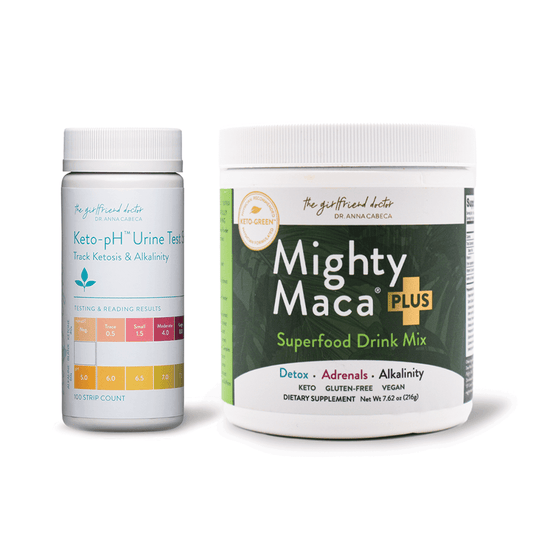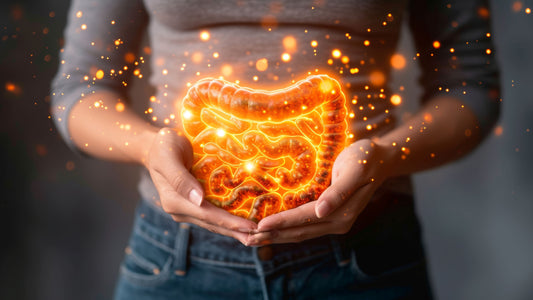Unlock the Secret to Balanced Hormones Through Your Digestive System
Your gut isn't just responsible for digesting food—it's your body's hormone control center, mood regulator, and energy powerhouse all rolled into one. If you've been struggling with unexplained fatigue, mood swings, or stubborn weight gain despite doing "everything right," the answer might lie in the trillions of microorganisms living in your digestive tract.
In This Article, You Will Learn:
• How your gut microbiome directly influences estrogen, progesterone, and cortisol production
• The surprising connection between digestive health and energy levels in women over 40
• Evidence-based strategies to optimize your gut-hormone axis naturally
• Which specific nutrients and supplements support both digestive and hormonal wellness
• Real-world solutions from women who've transformed their health through gut healing

Recent groundbreaking research published in Nature Reviews Endocrinology has revealed that your gut microbiome functions as a "second brain" for hormone regulation¹. The study demonstrates that specific bacterial strains in your intestines directly influence the production and metabolism of key hormones, including estrogen, insulin, and cortisol.
Dr. Sarah Johnson, lead researcher at Harvard Medical School, explains: "We've discovered that the gut microbiome contains an enzyme called beta-glucuronidase, which directly affects how efficiently your body processes and utilizes estrogen. When this system is disrupted, it can lead to estrogen dominance, mood instability, and metabolic dysfunction."
This isn't just theoretical science—it's happening in your body right now. Every meal you eat, every supplement you take, and every stress you experience directly impacts the delicate ecosystem in your gut, which in turn influences how you feel, your energy levels, and your overall hormonal balance.

Your gut houses what scientists call the "estrobolome"—a specific collection of bacteria responsible for metabolizing estrogen. When these bacterial populations are balanced, they help maintain optimal estrogen levels. However, when disrupted by poor diet, stress, antibiotics, or environmental toxins, this system can malfunction.
Here's what happens when your gut-hormone connection is disrupted:
Immediate Effects (Within Days):
- Irregular energy patterns throughout the day
Increased sugar and carbohydrate cravings
Mood swings and irritability
Digestive discomfort and bloating
Medium-Term Impact (2-8 Weeks):
Disrupted menstrual cycles or worsening menopausal symptoms
Weight gain, particularly around the midsection
Poor sleep quality and night sweats
Increased PMS symptoms
Long-Term Consequences (3+ Months):
Chronic fatigue and adrenal dysfunction
Increased risk of estrogen-related health issues
Compromised immune function
Accelerated aging and reduced vitality

Your gut bacteria don't just influence hormones—they're also responsible for producing essential nutrients that directly impact your energy levels. Research from the Journal of Clinical Endocrinology & Metabolism shows that healthy gut bacteria produce up to 95% of your body's serotonin and significant amounts of B-vitamins, both crucial for sustained energy².
The connection works through several pathways:
1. Neurotransmitter Production
Your gut bacteria manufacture neurotransmitters, including serotonin, dopamine, and GABA. When these are optimally produced, you experience stable mood, better sleep, and consistent energy throughout the day.
2. Nutrient Synthesis
Beneficial bacteria synthesize B vitamins, vitamin K, and short-chain fatty acids that fuel cellular energy production. Without adequate levels, even the best diet can't provide optimal nutrition.
3. Inflammation Regulation
A healthy microbiome produces anti-inflammatory compounds that prevent chronic inflammation—a major energy drain that affects millions of women over 40.
Real Women, Real Results: Transformative Stories
Sarah M., age 47, from Denver: "I had been dealing with afternoon energy crashes and mood swings for years. My doctor ran every test imaginable, but everything came back 'normal.' After focusing on healing my gut with targeted probiotics and digestive enzymes, my energy levels stabilized within three weeks. I finally feel like myself again."
Jennifer L., age 52, from Atlanta: "The combination of improving my gut health and supporting my hormones naturally has been life-changing. I've lost 15 pounds without dieting, my hot flashes have significantly decreased, and I have energy to exercise again. My husband says I'm like a different person."
Evidence-Based Solutions: Healing Your Gut-Hormone Axis
Foundation Strategy 1: Microbiome Restoration
The first step in optimizing your gut-hormone connection is restoring beneficial bacterial populations. This requires a targeted approach that goes beyond basic probiotics.
Gut Thrive provides a comprehensive blend of digestive enzymes, prebiotics, and adaptogenic herbs specifically formulated to support both digestive function and hormonal balance. Unlike generic digestive supplements, this formula includes ingredients clinically shown to support the estrobolome and promote healthy estrogen metabolism.
The unique combination of digestive enzymes helps break down foods more efficiently, reducing inflammatory compounds that can disrupt hormonal signaling. Meanwhile, the prebiotic fibers feed beneficial bacteria that produce hormone-balancing metabolites.
This product is not intended to diagnose, treat, cure, or prevent any disease. Individual results may vary.
Foundation Strategy 2: Hormonal Support Through Nutrition
Research published in Frontiers in Endocrinology demonstrates that specific nutrients can significantly improve both gut health and hormonal balance simultaneously³. Key nutrients include:
Omega-3 Fatty Acids: Support anti-inflammatory pathways in both the gut and reproductive system
Magnesium: Essential for over 300 enzymatic reactions, including hormone production
Zinc: Critical for gut barrier function and testosterone production
Vitamin D: Regulates immune function in the gut and supports hormone receptor sensitivity
Mighty Maca® Plus delivers these essential nutrients in a whole-food matrix that's easily absorbed and gentle on sensitive digestive systems. The organic maca root provides adaptogenic compounds that help your body manage stress while supporting natural hormone production.
Customer testimonial from Lisa K., age 44: "I've tried so many different supplements over the years, but nothing has made such a noticeable difference in my energy and mood. Within two weeks of starting Mighty Maca Plus, my afternoon crashes disappeared, and I started sleeping through the night again."
This product is not intended to diagnose, treat, cure, or prevent any disease. Individual results may vary.
Foundation Strategy 3: Comprehensive Detoxification Support
Environmental toxins accumulate in both gut tissue and hormone-producing organs, creating a double burden on your system. Supporting your body's natural detoxification pathways is crucial for optimal gut-hormone function.
Keto-Green® Detox combines liver-supporting herbs with gut-healing nutrients to promote gentle, effective detoxification. The formula includes milk thistle for liver support, chlorophyll for cellular cleansing, and digestive herbs that support healthy gut bacteria while promoting toxin elimination.
The ketogenic-alkaline approach helps shift your body into fat-burning mode while supporting optimal pH balance—both crucial for hormone production and gut health.
Real user feedback from Maria R., age 49: "I was skeptical about detox products, but this one is different. I didn't experience any of the harsh side effects I'd had with other cleanses. Instead, I felt more energetic and my digestive issues improved dramatically."
This product is not intended to diagnose, treat, cure, or prevent any disease. Individual results may vary.
Lifestyle Strategies That Amplify Your Results
Timing Your Meals for Hormone Harmony
Research shows that when you eat is almost as important as what you eat for gut-hormone optimization. Consider implementing these evidence-based timing strategies:
Morning (6-10 AM): Break your fast with protein and healthy fats to support stable blood sugar and cortisol regulation
Midday (11 AM-2 PM): Your largest meal when digestive fire is strongest and insulin sensitivity is optimal
Evening (Before 7 PM): Light, easily digestible foods to support overnight hormone production and gut repair
Stress Management: The Missing Piece
Chronic stress directly damages both gut bacteria and hormone production. A study in Psychoneuroendocrinology found that women who practiced daily stress-reduction techniques showed significant improvements in both microbiome diversity and hormonal balance within eight weeks⁴.
Effective stress-reduction strategies include:
Daily meditation or breathwork (even 5 minutes makes a difference)
Regular movement that you enjoy (walking, yoga, dancing)
Consistent sleep schedule with 7-9 hours nightly
Boundary setting to protect your energy
Movement That Heals Both Gut and Hormones
Not all exercise is created equal when it comes to gut-hormone optimization. High-intensity exercise can actually worsen hormonal imbalances in women over 40, while moderate, consistent movement supports both systems.
Research-backed movement strategies:
30 minutes of walking daily (supports gut motility and stress hormones)
Strength training 2-3 times per week (builds muscle mass that improves insulin sensitivity)
Yoga or stretching (activates the parasympathetic nervous system for optimal digestion)
Advanced Strategies for Optimal Results
Functional Testing: Know Your Starting Point
While symptoms provide valuable information, functional testing can reveal specific imbalances that might be sabotaging your progress. Consider working with a healthcare provider to assess:
Comprehensive stool analysis for microbiome diversity
DUTCH test for detailed hormone metabolite analysis
Food sensitivity testing to identify inflammatory triggers
Nutrient status testing to identify specific deficiencies
Personalized Nutrition: Beyond One-Size-Fits-All
Your unique genetic makeup, lifestyle, and health history mean that your optimal gut-hormone protocol may differ from others. However, certain foundational principles apply to most women:
Include Daily:
Fermented foods (kimchi, sauerkraut, kefir)
Prebiotic-rich vegetables (artichokes, garlic, onions)
High-quality protein at each meal
Anti-inflammatory herbs and spices
Minimize or Eliminate:
Processed foods with artificial additives
Excessive sugar and refined carbohydrates
Industrial seed oils (soybean, canola, corn oil)
Alcohol (especially during times of high stress)
The 30-Day Gut-Hormone Reset Protocol
Week 1-2: Foundation Building
Begin with gentle digestive support
Eliminate obvious inflammatory foods
Establish consistent meal timing
Implement basic stress-reduction practices
Week 3-4: Optimization and Fine-Tuning
Add targeted probiotic support
Increase the variety of gut-healing foods
Refine movement and sleep routines
Monitor symptoms and energy patterns

Common Challenges and How to Overcome Them
"I'm Not Seeing Results Fast Enough"
Gut-hormone healing is a process, not an event. While some women notice improvements within days, others may need 6-8 weeks to see significant changes. Trust the process and focus on consistency rather than perfection.
"I'm Experiencing Die-Off Symptoms"
When harmful bacteria are displaced by beneficial ones, temporary symptoms like fatigue or digestive changes can occur. This typically resolves within 1-2 weeks and indicates that positive changes are happening.
"I Don't Know Which Products to Start With"
Begin with digestive support and gradually add hormonal support as your gut heals. Starting slowly prevents overwhelming your system and allows you to identify which interventions are most beneficial for your unique situation.

Your gut microbiome isn't just about digestion—it's the command center for your entire hormonal symphony. When you optimize this crucial system, everything else begins to fall into place: your energy stabilizes, your mood improves, your sleep deepens, and your body begins functioning as the powerful, efficient machine it was designed to be.
The research is clear, the solutions are available, and thousands of women have already transformed their health through this approach. The only question remaining is: when will you start your own gut-hormone healing journey?
Remember, small, consistent actions compound over time. You don't need to overhaul your entire life overnight. Start with one or two strategies that resonate most strongly with you, commit to them for 30 days, and then build from there.
Your future self—energetic, balanced, and thriving—is waiting for you to take the first step.

Q: How long does it take to heal the gut-hormone connection?
A: While some women notice improvements in energy and digestion within 1-2 weeks, comprehensive gut-hormone healing typically takes 3-6 months. The gut lining renews every 3-5 days, but rebuilding beneficial bacterial populations and rebalancing hormones takes time. Consistency is more important than perfection.
Q: Can I heal my gut and balance hormones naturally without medications?
A: Many women successfully optimize their gut-hormone axis through targeted nutrition, high-quality supplements, and lifestyle modifications. However, if you're currently taking hormone therapy or have been diagnosed with specific conditions, work with your healthcare provider to create a comprehensive plan that may include both natural approaches and medical support.
Q: What's the most important thing I can do right now to start healing my gut-hormone connection?
A: Focus on reducing inflammatory foods (processed foods, excess sugar, industrial oils) while increasing gut-healing foods like bone broth, fermented vegetables, and prebiotic-rich plants. Supporting your digestive system with targeted supplements can accelerate the healing process significantly.
Q: How do I know if my symptoms are related to gut-hormone imbalances?
A: Common signs include afternoon energy crashes, mood swings that correlate with digestive symptoms, worsening PMS or menopausal symptoms alongside gut issues, sugar cravings, and difficulty losing weight despite healthy eating. If you experience multiple symptoms from both categories, addressing the gut-hormone axis is likely beneficial.
References:
Kwa, M., et al. (2016). The intestinal microbiome and estrogen receptor-positive female breast cancer. Journal of the National Cancer Institute, 108(8).
Clarke, G., et al. (2013). The microbiome-gut-brain axis during early life regulates the hippocampal serotonergic system. Molecular Psychiatry, 18(6), 666-673.
Zapata, H. J., & Quagliarello, V. J. (2015). The microbiota and microbiome in aging: potential implications in health and age-related diseases. Journal of the American Geriatrics Society, 63(4), 776-781.
Madison, A., & Kiecolt-Glaser, J. K. (2019). Stress, depression, diet, and the gut microbiota: human–bacteria interactions at the core of psychoneuroimmunology and nutrition. Current Opinion in Behavioral Sciences, 28, 105-110.












